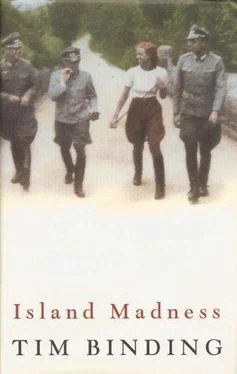“So this is yours?”
“It was on my head, if that’s what you mean.”
“It’s a man’s hat.”
“You think I stole it? It’s my father’s. Was my father’s. I persuaded him to let me wear it.” She took it from him and set it at an angle on her head. “Looks better on me, don’t you think?”
“That depends. I’ve never seen your father, have I? I don’t even know his name.”
“No?” She took the hat off and turned it over and pointed to the marking on the label.
“His initials, see? You know what they stand for.”
Ned peered and blushed violently. He hardly knew where to look. The girl smiled victoriously. She’d enjoyed the joke many times before.
“Van Dielen,” she said, laughing at him again. “Nothing else.”
“Van Dielen?” He could not keep the note of surprise out of his voice.
“That’s right. Why? Has he broken the law?”
No, he had not broken the law, but as soon as she mentioned the name he knew that despite the island’s size she was lost to him. So he wished her a pleasant summer and walked away, watching her later as she presented her first-class ticket for her private cabin, while he, an old hand, walked briskly to the wooden seats around the tunnel, and sat, with his greatcoat over his knees, waiting for the hour of midnight to strike, when the hooter would sound and the sea would churn. He could have chosen to go inside, to have a few drinks and a rolling kip on one of the hard slatted seats, but he preferred it out on deck, where he could sit, nursing his thoughts, travelling through the windy dark to the dawn outline of his home town.
Ned knew of the van Dielens. The whole island knew of the van Dielens and to whom they were related. Mr van Dielen, half English, half Dutch, had made his money first from construction work in the Middle East, and latterly in the great road-building programme snaking its way across Europe. Returning to England, hoping to capitalize on his expertise, he had found that he no longer cared for his abandoned homeland, not because it was strange to him, but because it was revealed as all too familiar. His life abroad had been lived as an outcast stuck in an outpost, out of sorts with his surroundings, forcing changes on a sleeping landscape, but England seemed unable to wake to his and others’ futuristic call. Coming back with an attractive wife and a marriage-able daughter he discovered that all that was required of him was that he should settle in and build bungalows and mock-Tudor suburbs with perhaps a new ladies’ room for a country railway station thrown in for good measure. There was nothing in England’s architectural plans that loomed large and impossible and wondrous to behold, nothing that sliced through the earth changing its people for ever; and as for the dinners and the young men he was expected to entertain on behalf of his daughter’s matrimonial expectations, it was difficult to fathom which he detested the more, the stuffed game he forced into his mouth or the stuffed shirts who produced barking buckshot out of theirs. So he settled on Guernsey, which was of England but not English, where the policemen acted under English law but the climate did not, where the signs were in English but where the natives, bred to bear a naturally taciturn disposition, spoke a language he could choose not to understand; above all a place where his wife and daughter could use the moneyed high life as a springboard to all the other social ports of call and from where the rich pickings of his Continental business beckoned.
And so, being an engineer, he built a house to suit both his temperament and his purpose, combining in its design his intense desire for solitude with a showman’s desire to display his architectural talents to the full. Ned knew the building well, for his father had been one of the carpenters contracted in to lay the floor. It stood, not on one of the grander roads leading out of St Peter Port, nor in the quieter more expensive reaches to the south, but on a dusty back road wedged in a dip between two hills, cramped for space and overlooking a row of undistinguished bungalows, surrounded by a riotous, unruly garden, with plants pushed into the earth to let do as they please; rot, run riot, fill the air with maddening seed, it did not matter to him, as long as they formed some impenetrable barrier between him and the road beyond. Through this fairy-tale tangle could be seen the front of the house, bulging out like an unwanted pregnancy, awkward and eye-catching, with plate-glass windows running from floor to ceiling. “Wouldn’t catch me living in it, not even if you paid me,” his father used to say. “A shit in a showroom would be more private.” The van Dielens moved in three months after completion, in May ‘38, surrounded by pink walls and tubular furniture, with rugs instead of carpets, something hooded, straight out of a blacksmith’s, in the middle of drawing room instead of a proper fireplace and, most peculiar at all, no curtains. Suspended above the grey metal window-frames hung reels of grey slatted metal blinds which, when lowered, shook and rattled at the slightest provocation and were only brought into use when decency demanded. Certainly Mr van Dielen didn’t care to use them, propped up at the curved cocktail bar he had built, sitting there alone surrounded by dancing semi-quavers and empty high stools. In the evening those who walked past would see him swirling something thick and cloudy in a strangely shaped glass, thinking about his dead wife, who lay in the cemetery half a mile away, drowned not two months after their arrival and his daughter, whom he hardly knew, packed off to finishing school. But, it was supposed, the house had done its job, and worked, like its owner, on some unfathomable law of incongruity: the long balconies and wide windows protected not by locks and curtains but by brambles and palm trees and rash-inducing rhododendron bushes; a house closed to all, yet with the owner perpetually on view; a man who talked to no one, but who himself was a constant talking point.
And they all talked about him, there was no doubt about that; what he was like to work for (firm but fair), his trips abroad, his determined, lonely life. He had bought out three concerns on Guernsey by then, a builder’s yard, a brick works and a contracting firm, and within six months had put two more out of business. He was a small man, small and intense, with a stooped back and dark eyebrows and a clipped moustache which worked up and down. He walked, said Ned’s father, like a clockwork toy, as if someone had just wound him up, oblivious to his surroundings. You half expected him to topple over, or stumble up against some unopened door, legs still whirring. He was always in a hurry, no time for idle chatter, just an awkward muttered greeting, head back down, and the sound of his breath rushing past. When he was here he could be seen in his green Norfolk jacket, marching his wicker basket down to the market to place a spider crab or small live lobster on top of the rest of his meagre shopping before pushing his charge back up Victoria Road and home. That was another conundrum that was brought to his account. A builder of roads and bridges, he owned no vehicle and had no garage built for one. Ned’s old school friend Bernie Ie Cocq had tried to interest in him in one of his machines with a free bicycle thrown in for his daughter, but he would have none of it, telling Bernie in a curt letter that as he had his legs and his daughter, when she was here, had her horse, he would be grateful if he kept his suggestions to himself, a letter which Bernie had placed in the little office above his garage, next to his postcard of a fleshy French girl dressed in fat suspenders. So he had his legs and Isobel her horse—which is how Ned met her the second time, as he hurtled down on the butcher’s bike he had won years back in a raffle, shaking down the steep dry rut of water lanes, his legs splayed out, his eyes closed, gathering glorieus speed remembering those summer rides with Bernie and Veronica Vaudin, until he heard the scream and opened his eyes to see a horse, a bloody horse, standing stock-still with a girl upon it, up in the stirrups, crying out in fear that he might harm them both. He wrenched his hands sharply to the right and ended up capsized upon the fern-thick bank with his legs in the air, his spine jarred and a bicycle wheel humming in his ear. Only when the horse moved closer, prancing nervously on the stony ground, did he realize who the rider was.
Читать дальше












